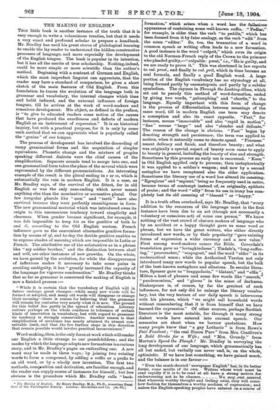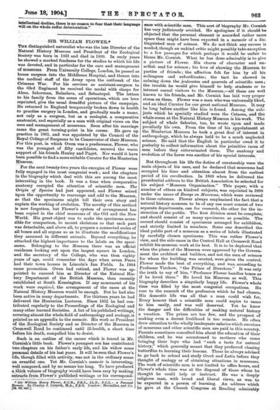a very exact and profound scholar to prepare a handbook.
Mr. Bradley has used his great stores of philological learning to enable the lay reader to understand the hidden constructive processes of language, and more especially the development of the English tongue. The book is popilar in its intention, but it has all the merits of true scholarship. Nothing, indeed, could be more simple or more scientific than the author's method. Beginning with a contrast of German and English, which the most imperfect linguist can appreciate, that the reader may have a standard of comparison, he gives a short sketch of the main features of Old English. From this foundation he traces the evolution of the language both in grammar and vocabulary, the internal changes which time and habit induced, and the external influence of foreign tongues, till he arrives at the work of word-makers and conscious development. His object, as defined in the preface, is "to give to educated readers some notion of the causes that have produced the excellences and defects of modem English as an instrument of expression." It is an historical inquiry, but with a practical purpose, for it is only by some such method that we can appreciate what is popularly called the " genius " of our tongue.
The process of development has involved the discarding of many grammatical forms and the acquisition of simpler equivalents. Phonetic change and the mixture of peoples speaking different dialects were the chief causes of the simplification. Separate sounds tend to merge into one, and one grammatical form takes the place of the several which were represented by the different pronunciations. An interesting
example of the result is the plural ending in s or es, which is substantially the rule in modern English. It is a case, as
Mr. Bradley says, of the survival of the fittest, for in old English as was the only case-ending which never meant anything else than the nominative or accusative plural. Our few irregular plurals like " men " and " teeth " have also survived because they were perfectly unambiguous in form.
The new grammatical material which was introduced owes its origin to this unconscious tendency toward simplicity and clearness. When gender became significant, for example, it was felt impossible to keep his as the genitive of both he and it, according to the Old English custom. French influence gave us the convenient alternative genitive forma- tion by means of of, and to-day the double genitive enables us to express shades of meaning which are impossible in Latin or French. The attributive use of the substantive as in a phrase like "my soldier brother," and the distinction between shall and will, are other instances of new growths. On the whole, we have gained by the evolution, for while the disappearance of inflexions makes it necessary to take some pains in avoiding ambiguity, it has "greatly increased the capacity of the language for vigorous condensation." Mr. Bradley thinks that so far as grammar is concerned the making of English is now a finished process :— "While it is certain that the vocabulary of English will in future undergo great changes—while many new words will be formed or adopted, and many old words will disappear or change their meaning—there is reason for believing that the grammar will remain for centuries very nearly what it is now. The ground for this belief lies partly in the spread of education. Literary culture perhaps on the whole conduces to tolerance of certain kinds of innovation in vocabulary, but with regard to grammar its tendency is strongly conservative. Another reason is that simplification of accidence has nearly attained its utmost con- ceivable limit, and that the few further steps in this direction that remain possible would involve practical inconvenience."
Word-making, then, is the only force at work which will render our English a little strange to our grandchildren; and the modes by which the language adopts new formations is a curious story, and in Mr. Bradley's pages an enthralling one. A new word may be made in three ways : by joining two existing words to form a compound, by adding a suffix or a prefix to
an old word, or by a wholly new invention. The first two methods, composition and derivation, are familiar enough, and the reader can supply scores of instances for himself; but less obvious is the procedure which Mr. Bradley calls " back-
• The Making of English. By Henry Bradley. M.A., Ph.D., Sometime Presi- dent of the Philological Society. London : Macmillan and Co. [4e. 6d.]
formation," which arises when a word has the fallacious appearance of containing some well-known suffix. "Pedlar," for example, is older than the verb "to peddle," which has been formed from it by false analogy, as the verb " edit " from the noun "editor." So, too, the truncation of a word in common speech or writing often leads to a new formation. A good instance is the word "culprit," which owes its origin
to the old Norman-French reply of the Crown to the prisoner who pleaded guilty,—" culpable: prest," i.e., "He is guilty, and we are ready to prove it." This was shortened in law reports to cut. prest., and finally to cut. prit, which in time became an oral formula, and finally a good English word. A lame portion of the English vocabulary has no etymology at all, being formed partly by onomatopoeia and partly by a subtler symbolism. The rhymes in Through the Looking-Glass, which set out to parody this method of word-formation, ended by giving two words, "galumphing" and "chortle," to the language. Equally important with this form of change is the process of differentiation between meanings of the
same word, till in modern English one term may denote a conception and also its exact opposite. "Fast," for instance, means "immovable" and also "rapid in motion"; " fine " means " large " and also "slender and delicate." The reason' of the change is obvious. "Fast" began by denoting 'strength and persistence; the term was applied to motion, when it naturally came to denote speed. " Fineness " meant delicacy and finish, and therefore beauty; and what
was originally a special aspect of beauty soon came to apply to beauty in general, including the beauty of size and strength.
Sometimes by this process an early use is recovered. ," Keen" in Old English applied only to persons; then metaphorically
it was applied to a soldier's weapon; and now by a second metaphor we have recaptured also the older application. Sometimes the literary use of a word has altered its meaning. "Egregious" and "sapient," being so frequently used in satire, became terms of contempt instead of, as originally, epithets of praise; and the word" silly" from its use in irony has com- pletely lost its old meaning of " blessed " or "happy."
It is a truth often overlooked, Etays Mr. Bradley, that "every addition to the resources of the language must in the first
instance have been due to an act (though not necessarily a voluntary or conscious act) cif some one person." We know nothing of the vast crowd of obscure makers of language who by an accident or a happy thought gave us some word or phrase, but we have the great writers, who either directly introduced new words, or by their popularity "gave existing forms of expression a wider currency and a new value."
First among word-makers comes the Bible. Coverdale's translation gave us "loving-kindness"; Tindale's, "long-suffer- ing," "peacemaker," "scapegoat," and the word "elder" in its ecclesiastical sense; while the Authorised Version not only introduced many new words to popular speech, but the bulk of the best-known metaphors and allusions. In secular litera- ture, Spenser gave us "braggadocio," "blatant," and " elfin "; Milton a host of phrases and some few words like " anarch," "pandemonium," and "gloom" in the sense of darkness. Shakespeare is, of course, by far the greatest of such influences, for not only did he enlarge the literary' vocabu- lary, but the very texture of our daily speech is interwoven with his phrases, which "we might call household words without remembering that it is from himself that we have
learned the expression." Of other sources, perhaps Scottish literature is the most notable, for through it many strong
dialect words have entered into current speech. Our memories are short when we borrow quotations. How many people know that "a gay Lothario " is , from Rowe's Fair Penitent; "the real Simon Pure" from Mrs. Centlivre's A Bold Stroke for a Wife ; and "Mrs. Grundy," from Morton's Speed the Plough ? Mr. Bradley in surveying the
'long development of our language, which grammatically has all but ended, but verbally can never end, is, on the whole, optimistic. If we have lost something, we have gained much, and the balance is in our favour :—
" Even the much-decried newspaper English has, in its better forms, some merits of its own. Writers whose work must be read rapidly if it is to be read at all have a strong motive for endeavouring not to be obscure , may rest assured, that wherever worthy thought and feeling exist, they will some- how fashion for themselves a worthy medium of expression; and unless the English-speaking peoples have entered on a course of







































 Previous page
Previous page